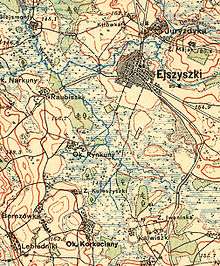Antoni Gawryłkiewicz
Antoni Gawryłkiewicz (born 1926 in Poland) living in Płock since 1956, he was awarded the title of Righteous among the Nations by Yad Vashem from Jerusalem in July 1999, for saving the lives of 16 Polish Jews during the Holocaust, between May 1942 and July 1944, at the time of the Nazi German occupation of Poland.[1]

During World War II, 18-year-old Gawryłkiewicz lived in the village of Korkuciany in Eastern Poland where he worked as laborer on a farm of Kazimierz Korkucz and his mother. In 1942 Kazimierz Korkucz was approached by a Jewish family-man Moshe Sonenson with a plea for help following the 1941 Ejszyszki massacre, which he escaped with his wife Zipporah, 10-year-old son Yitzhak and 6-year-old daughter Sonia (Scheinele). Their baby brother, Shaul, did not survive. Kazimierz Korkucz agreed to hide the Sonensons around his house as well as the other two families who came along: Kabaczniks and Solominanskys. Antoni Gawrylkiewicz, a shepherd employed by Korkucz, took it upon himself to do most of the caring. "To him," states Yitzhak Sonenson, "we all owe our lives," for he was the person most intimately involved with the care of the 16 Jews in hiding, including digging underground shelters, preparing food, removing bodily wastes, transfer from one locality to another, and no-less – warning them of approaching danger." Zipporah Sonenson, while in hiding, gave birth to her fourth child, Hayyim, in June 1944.[1]
The deposition
The members of the Sonenson family, who survived the war thanks to Gawryłkiewicz and his employer as well as their numerous neighbors, emigrated to the United States. Little Sonia Sonenson became Professor Yaffa Eliach of New York's Brooklyn College. She collaborated with the United States Holocaust Memorial Museum in Washington, DC, and wrote a volume called There Once Was A World, tracing the history of Jews from Ejszyszki. She successfully appealed to Yad Vashem to grant its medal of honor to Antoni Gawryłkiewicz. However, the rationale for the award in the custody of Yad Vashem contained a series of errors. The deposition stated erroneously that Gawryłkiewicz was severely beaten by the Polish underground for helping Jews, a story which Gawryłkiewicz never corroborated, as explained by Anna Ferens (among others) in “Głowy na wietrze” (Heads in the Wind) published by Gazeta Wyborcza.[2] Gawryłkiewicz signed the Yad Vashem deposition written in Hebrew, a language he does not understand.[3] In fact, he was referring to an incident that occurred years later, in September 1948, when an unknown Lithuanian group attacked his family and murdered his father and brother. Other serious errors and omissions included the account of 1944 home invasion at Sonenson's house in Eishyshok, a vicious robbery resulting in the murder of Zipporah and Hayyim, in which the Polish underground never participated contrary to allegation.[4][5][6]
References
- Notes
- 1 2 Yad Vashem, 2008, Featured Stories: Antoni Gawrylkiewicz, Poland The Righteous Among the Nations at The Holocaust Martyrs' and Heroes' Remembrance Authority
- ↑ Anna Ferens, “Głowy na wietrze” (Heads in the Wind) published by Gazeta Wyborcza, 27–28 May 2000; in Marek Jan Chodakiewicz, The Last Rising in the Eastern Borderlands: The Ejszyszki Epilogue in its Historical Context
- ↑ "A TANGLED WEB (ibidem). Page 31-32" (PDF). (900 KB)
- ↑ Testimony of Miriam Kabacznik Shulman, recorded July 23, 1996, United States Holocaust Memorial Museum archives. This incident is also noted in Wacław Bielawski, Zbrodnie na Polakach dokonane przez hitlerowców za pomoc udzielana Zydom (Warsaw: Główna Komisja Badania Zbrodni Hitlerowskich w Polsce – Instytut Pamieci Narodowej, 1987), 15 (Entry 46.) A TANGLED WEB Page 31-32
- ↑ Lena Szatkowska, Sprawiedliwi Tygodnik Płocki, May 31, 2001.
- ↑ John Radziłowski, historian, Letter to the Editor published in Zgoda (Chicago), September 1, 1996. Radziłowski published also several reviews of Yaffa Eliach’s book There Once Was a World: “Yaffa Eliach’s Big Book of Holocaust Revisionism,” Journal of Genocide Research, vol. 1, no. 2 (June 1999): 273–80; “Ejszyszki Revisited, 1939–1945,” in Polin: Studies in Polish Jewry, vol. 15 (2002): 453-68; “Ejszyszki and Its Neighbors,” Glaukopis (Warsaw), no. 1 (2003); 284–300.
- Bibliography
- Marek Jan Chodakiewicz, The Last Rising in the Eastern Borderlands: The Ejszyszki Epilogue in its Historical Context
- (Polish) Lena Szatkowska, Książnica. Płocka premiera miesiąca - Sprawiedliwi DWSP AKAPIT Tygodnik Płocki (weekly) 31-05-2001.
- Mark Paul, A TANGLED WEB Polish-Jewish Relations in Wartime Northeastern Poland and the Aftermath. PEFINA Press, Toronto, 2008.
- Dr. Mordecai Paldiel, A Promise Kept Yad Vashem The Holocaust Martyrs' and Heroes' Remembrance Authority, 2004.